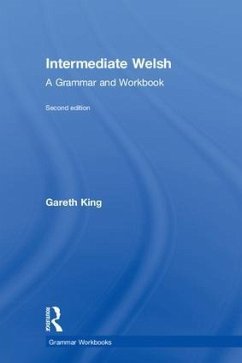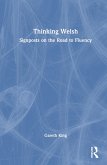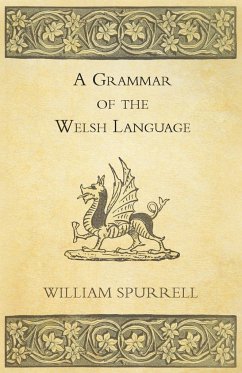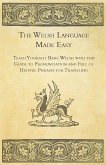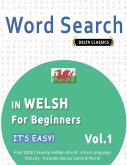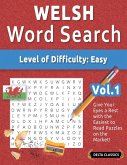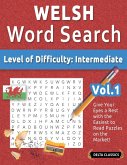- Gebundenes Buch
- Merkliste
- Auf die Merkliste
- Bewerten Bewerten
- Teilen
- Produkt teilen
- Produkterinnerung
- Produkterinnerung
Intermediate Welsh, a grammar and workbook, is designed for learners who have achieved basic proficiency, and wish to proceed to more complex language.
Andere Kunden interessierten sich auch für
![Thinking Welsh Thinking Welsh]() Gareth KingThinking Welsh207,99 €
Gareth KingThinking Welsh207,99 €![A Grammar Of The Welsh Language A Grammar Of The Welsh Language]() William SpurrellA Grammar Of The Welsh Language32,99 €
William SpurrellA Grammar Of The Welsh Language32,99 €![The Welsh Language Made Easy - Teach Yourself Basic Welsh with this Guide to Pronunciation and Full of Helpful Phrases for Travelling The Welsh Language Made Easy - Teach Yourself Basic Welsh with this Guide to Pronunciation and Full of Helpful Phrases for Travelling]() Anon.The Welsh Language Made Easy - Teach Yourself Basic Welsh with this Guide to Pronunciation and Full of Helpful Phrases for Travelling29,99 €
Anon.The Welsh Language Made Easy - Teach Yourself Basic Welsh with this Guide to Pronunciation and Full of Helpful Phrases for Travelling29,99 €![WORD SEARCH IN WELSH FOR ADULTS - IT'S EASY! VOL.1 - DELTA CLASSICS - FIND 2000 CLEVERLY HIDDEN WORDS WORD SEARCH IN WELSH FOR ADULTS - IT'S EASY! VOL.1 - DELTA CLASSICS - FIND 2000 CLEVERLY HIDDEN WORDS]() Best Activity BooksWORD SEARCH IN WELSH FOR ADULTS - IT'S EASY! VOL.1 - DELTA CLASSICS - FIND 2000 CLEVERLY HIDDEN WORDS13,99 €
Best Activity BooksWORD SEARCH IN WELSH FOR ADULTS - IT'S EASY! VOL.1 - DELTA CLASSICS - FIND 2000 CLEVERLY HIDDEN WORDS13,99 €![WORD SEARCH IN WELSH FOR BEGINNERS - IT'S EASY! VOL.1 - DELTA CLASSICS - FIND 2000 CLEVERLY HIDDEN WORDS WORD SEARCH IN WELSH FOR BEGINNERS - IT'S EASY! VOL.1 - DELTA CLASSICS - FIND 2000 CLEVERLY HIDDEN WORDS]() Best Activity BooksWORD SEARCH IN WELSH FOR BEGINNERS - IT'S EASY! VOL.1 - DELTA CLASSICS - FIND 2000 CLEVERLY HIDDEN WORDS13,99 €
Best Activity BooksWORD SEARCH IN WELSH FOR BEGINNERS - IT'S EASY! VOL.1 - DELTA CLASSICS - FIND 2000 CLEVERLY HIDDEN WORDS13,99 €![WELSH WORD SEARCH - LEVEL OF DIFFICULTY WELSH WORD SEARCH - LEVEL OF DIFFICULTY]() Best Activity BooksWELSH WORD SEARCH - LEVEL OF DIFFICULTY13,99 €
Best Activity BooksWELSH WORD SEARCH - LEVEL OF DIFFICULTY13,99 €![WELSH WORD SEARCH - LEVEL OF DIFFICULTY WELSH WORD SEARCH - LEVEL OF DIFFICULTY]() Best Activity BooksWELSH WORD SEARCH - LEVEL OF DIFFICULTY13,99 €
Best Activity BooksWELSH WORD SEARCH - LEVEL OF DIFFICULTY13,99 €-
-
-
Intermediate Welsh, a grammar and workbook, is designed for learners who have achieved basic proficiency, and wish to proceed to more complex language.
Hinweis: Dieser Artikel kann nur an eine deutsche Lieferadresse ausgeliefert werden.
Hinweis: Dieser Artikel kann nur an eine deutsche Lieferadresse ausgeliefert werden.
Produktdetails
- Produktdetails
- Verlag: Routledge
- 2. Auflage
- Seitenzahl: 196
- Erscheinungstermin: 6. März 2018
- Englisch
- Abmessung: 240mm x 161mm x 15mm
- Gewicht: 464g
- ISBN-13: 9781138063785
- ISBN-10: 1138063789
- Artikelnr.: 57044480
- Herstellerkennzeichnung
- Libri GmbH
- Europaallee 1
- 36244 Bad Hersfeld
- gpsr@libri.de
- Verlag: Routledge
- 2. Auflage
- Seitenzahl: 196
- Erscheinungstermin: 6. März 2018
- Englisch
- Abmessung: 240mm x 161mm x 15mm
- Gewicht: 464g
- ISBN-13: 9781138063785
- ISBN-10: 1138063789
- Artikelnr.: 57044480
- Herstellerkennzeichnung
- Libri GmbH
- Europaallee 1
- 36244 Bad Hersfeld
- gpsr@libri.de
Gareth King was UCAS Co-ordinator, Oxbridge Applications Co-ordinator and Latin Co-ordinator for a large sixth-form college. He is also the series editor for the Colloquials, and the author of numerous books for learners of Welsh, including Modern Welsh: A Comprehensive Grammar, The Routledge Intermediate Welsh Reader and Basic Welsh, the companion volume to this one.
Introduction 1 Inflected future: regulars 2 Inflected future: irregulars 3
Galla i°/medra i° 'I can', etc. 4 Byth and erioed 'never/ever' 5 Comparison
of adjectives I: comparison 6 Comparison of adjectives II: superlative;
equative 7 Comparison of adjectives III: irregulars 8 'Time'; ordinal
numerals 9 Aspect distinctions with VNs: newydd°, ar° and heb° with VNs 10
Alternative preterite formations 11 Subordinate clauses I 12 Subordinate
clauses II 13 Subordinate clauses III 14 Relative clauses I 15 Relative
clauses II 16 Conditional of bod; conditional of other verbs 17 Conditional
sentences I: open conditions 18 Conditional sentences II: closed conditions
19 Other unreality verbs: gallwn i°/medrwn i°, dylwn i°, leiciwn i°/hoffwn
i° 20 Unreality verbs with wedi: 'should have...', 'could have...', 'might
have...', etc. 21 Colloquial passive construction with cael 22 Stative
passives with wedi and heb° 23 Formal/media (or short) passive in -ir and
-wyd 24 More conjugated prepositions 25 Compound prepositions 26
Miscellaneous pronouns I 27 Miscellaneous pronouns II 28 Gwybod 'know'; sa
i, so ti, etc. (neg) 29 Summary of SM 30 Conjunctions I 31 Conjunctions II
32 Focus I: principles 33 Focus II: VNs, bod 34 Focus III: mai and taw 35
Summary of sy 36 Mutation of verb-forms in more formal styles 37 Literary
Welsh verbs I: the tense system of Literary Welsh 38 Literary Welsh verbs
II: forms of bod 39 Literary Welsh verbs III: irregulars; subjunctive forms
40 Literary Welsh verbs IV: autonomous/impersonal forms Key to exercises
Glossary of technical terms Vocabularies: Welsh-English; English-Welsh
Galla i°/medra i° 'I can', etc. 4 Byth and erioed 'never/ever' 5 Comparison
of adjectives I: comparison 6 Comparison of adjectives II: superlative;
equative 7 Comparison of adjectives III: irregulars 8 'Time'; ordinal
numerals 9 Aspect distinctions with VNs: newydd°, ar° and heb° with VNs 10
Alternative preterite formations 11 Subordinate clauses I 12 Subordinate
clauses II 13 Subordinate clauses III 14 Relative clauses I 15 Relative
clauses II 16 Conditional of bod; conditional of other verbs 17 Conditional
sentences I: open conditions 18 Conditional sentences II: closed conditions
19 Other unreality verbs: gallwn i°/medrwn i°, dylwn i°, leiciwn i°/hoffwn
i° 20 Unreality verbs with wedi: 'should have...', 'could have...', 'might
have...', etc. 21 Colloquial passive construction with cael 22 Stative
passives with wedi and heb° 23 Formal/media (or short) passive in -ir and
-wyd 24 More conjugated prepositions 25 Compound prepositions 26
Miscellaneous pronouns I 27 Miscellaneous pronouns II 28 Gwybod 'know'; sa
i, so ti, etc. (neg) 29 Summary of SM 30 Conjunctions I 31 Conjunctions II
32 Focus I: principles 33 Focus II: VNs, bod 34 Focus III: mai and taw 35
Summary of sy 36 Mutation of verb-forms in more formal styles 37 Literary
Welsh verbs I: the tense system of Literary Welsh 38 Literary Welsh verbs
II: forms of bod 39 Literary Welsh verbs III: irregulars; subjunctive forms
40 Literary Welsh verbs IV: autonomous/impersonal forms Key to exercises
Glossary of technical terms Vocabularies: Welsh-English; English-Welsh
Introduction 1 Inflected future: regulars 2 Inflected future: irregulars 3
Galla i°/medra i° 'I can', etc. 4 Byth and erioed 'never/ever' 5 Comparison
of adjectives I: comparison 6 Comparison of adjectives II: superlative;
equative 7 Comparison of adjectives III: irregulars 8 'Time'; ordinal
numerals 9 Aspect distinctions with VNs: newydd°, ar° and heb° with VNs 10
Alternative preterite formations 11 Subordinate clauses I 12 Subordinate
clauses II 13 Subordinate clauses III 14 Relative clauses I 15 Relative
clauses II 16 Conditional of bod; conditional of other verbs 17 Conditional
sentences I: open conditions 18 Conditional sentences II: closed conditions
19 Other unreality verbs: gallwn i°/medrwn i°, dylwn i°, leiciwn i°/hoffwn
i° 20 Unreality verbs with wedi: 'should have...', 'could have...', 'might
have...', etc. 21 Colloquial passive construction with cael 22 Stative
passives with wedi and heb° 23 Formal/media (or short) passive in -ir and
-wyd 24 More conjugated prepositions 25 Compound prepositions 26
Miscellaneous pronouns I 27 Miscellaneous pronouns II 28 Gwybod 'know'; sa
i, so ti, etc. (neg) 29 Summary of SM 30 Conjunctions I 31 Conjunctions II
32 Focus I: principles 33 Focus II: VNs, bod 34 Focus III: mai and taw 35
Summary of sy 36 Mutation of verb-forms in more formal styles 37 Literary
Welsh verbs I: the tense system of Literary Welsh 38 Literary Welsh verbs
II: forms of bod 39 Literary Welsh verbs III: irregulars; subjunctive forms
40 Literary Welsh verbs IV: autonomous/impersonal forms Key to exercises
Glossary of technical terms Vocabularies: Welsh-English; English-Welsh
Galla i°/medra i° 'I can', etc. 4 Byth and erioed 'never/ever' 5 Comparison
of adjectives I: comparison 6 Comparison of adjectives II: superlative;
equative 7 Comparison of adjectives III: irregulars 8 'Time'; ordinal
numerals 9 Aspect distinctions with VNs: newydd°, ar° and heb° with VNs 10
Alternative preterite formations 11 Subordinate clauses I 12 Subordinate
clauses II 13 Subordinate clauses III 14 Relative clauses I 15 Relative
clauses II 16 Conditional of bod; conditional of other verbs 17 Conditional
sentences I: open conditions 18 Conditional sentences II: closed conditions
19 Other unreality verbs: gallwn i°/medrwn i°, dylwn i°, leiciwn i°/hoffwn
i° 20 Unreality verbs with wedi: 'should have...', 'could have...', 'might
have...', etc. 21 Colloquial passive construction with cael 22 Stative
passives with wedi and heb° 23 Formal/media (or short) passive in -ir and
-wyd 24 More conjugated prepositions 25 Compound prepositions 26
Miscellaneous pronouns I 27 Miscellaneous pronouns II 28 Gwybod 'know'; sa
i, so ti, etc. (neg) 29 Summary of SM 30 Conjunctions I 31 Conjunctions II
32 Focus I: principles 33 Focus II: VNs, bod 34 Focus III: mai and taw 35
Summary of sy 36 Mutation of verb-forms in more formal styles 37 Literary
Welsh verbs I: the tense system of Literary Welsh 38 Literary Welsh verbs
II: forms of bod 39 Literary Welsh verbs III: irregulars; subjunctive forms
40 Literary Welsh verbs IV: autonomous/impersonal forms Key to exercises
Glossary of technical terms Vocabularies: Welsh-English; English-Welsh

